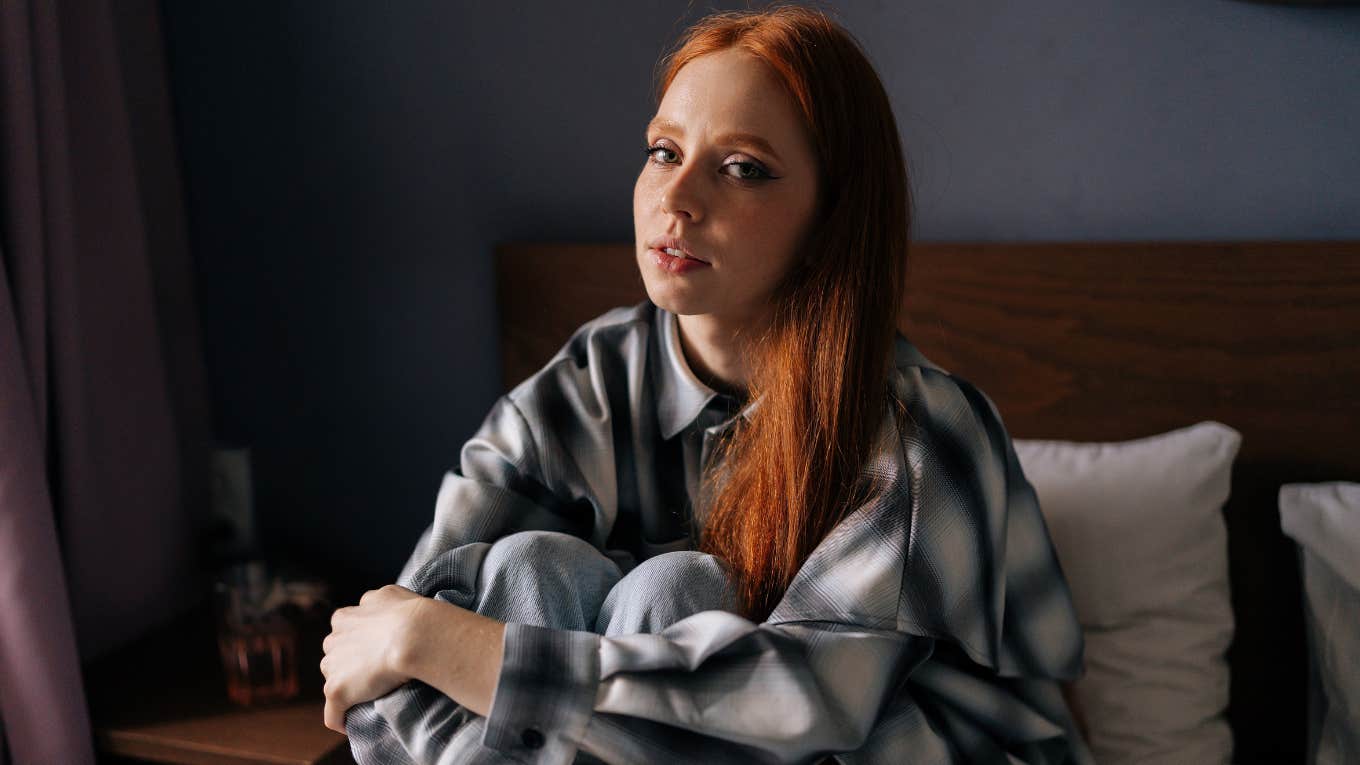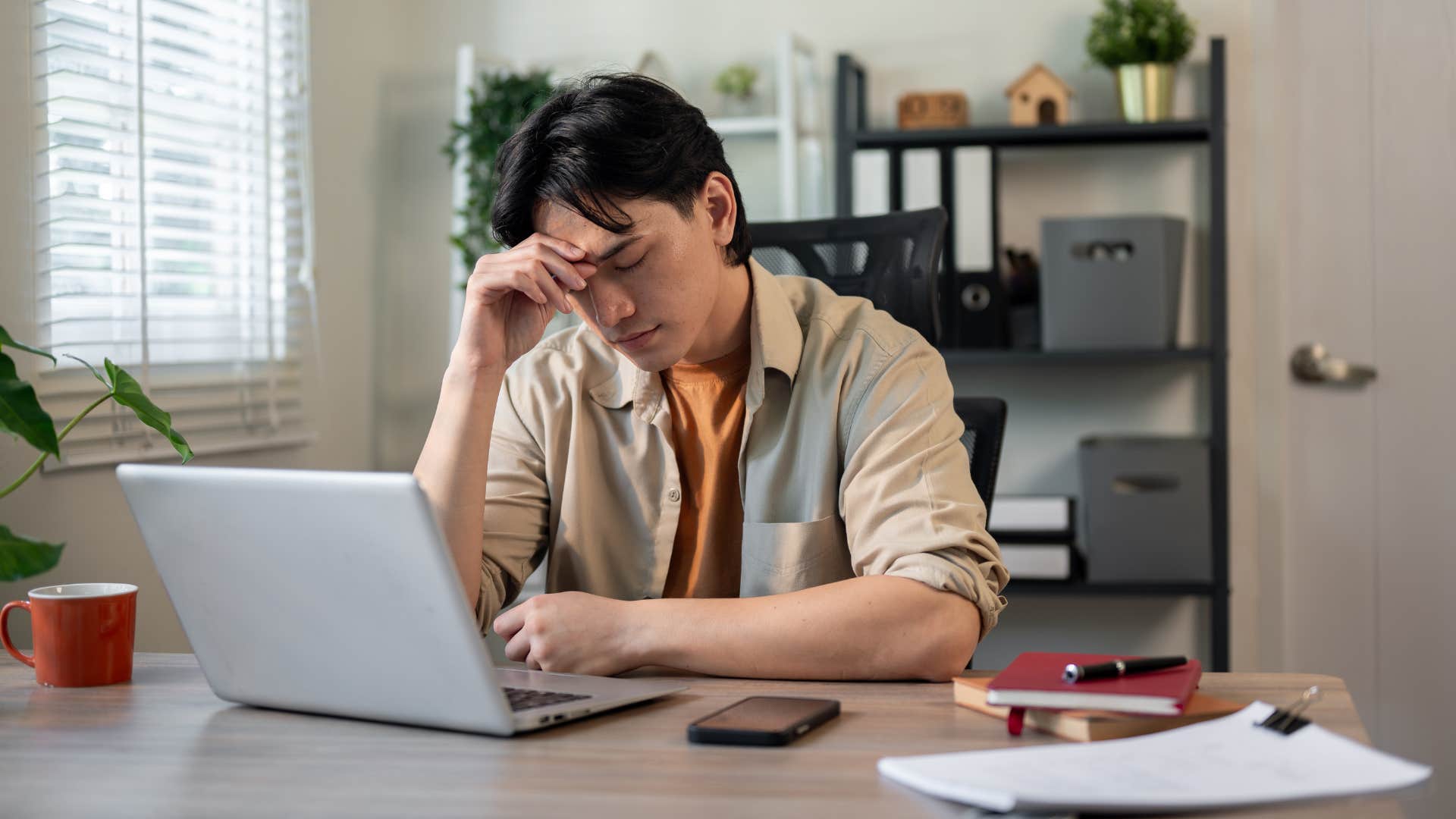11 Things That Used To Be Embarrassing Until Everyone Got Burned Out
We've now started embracing things that make us feel good!
 Dikushin Dmitry | Shutterstock
Dikushin Dmitry | Shutterstock When it comes to certain habits and behaviors, there used to once be a lot of shame surrounding them. It was as if we needed to keep this illusion that everything is good all of the time, even when it wasn't. However, times have changed and more people are not only exhausted from trying to keep up appearances, but they're starting to be more open about their mental health and well-being versus just hiding behind those old patterns.
We've all started speaking about how drained we are, whether it's physically, emotionally, and mentally, and the things that used to be embarrassing until everyone got burned out are no longer the same. What once felt like a personal failure has opened the door to a widespread issue that others are feeling too. No longer being embarrassed about doing certain things allows people to put themselves and their needs first, realizing it's perfectly fine to admit that you really don't have it all figured out.
Here are 11 things that used to be embarrassing until everyone got burned out
1. Taking naps during the day
 fizkes | Shutterstock
fizkes | Shutterstock
There was once a time when naps were seen as something that lazy people do, or were only reserved for kids, when you're sick, and older people. If you admitted to having taken a nap during the day, you were seen as not being motivated enough or falling short of this hustle culture that permeates our society.
People were proud to be exhausted, as if being tired meant you were doing something right. But now, napping is seen as a way to pour back into yourself. You aren't getting anything done if you're constantly tired and chugging coffee.
Research published in 2023 has even shown that those who napped for 30 minutes or less were 21% less likely to have elevated blood pressure compared to non-nappers. People are now realizing that the real reward is being able to rest and recharge so that you can pour everything you have into your work.
2. Asking for help
 Josep Suria | Shutterstock
Josep Suria | Shutterstock
For some time, people felt a bit weird about having to ask others for help or just needing support, in general. It was as if they felt this need to be strong enough to tackle all of the obstacles and hardships that fell in their lap. So, people chose to stay quiet and suffer in silence.
But now, asking for help has become one of the things that used to be embarrassing until everyone got burned out, as we've realized that community is so important and having a village is not a weakness at all.
"So how do we ask for help? It's easy to become indirect, shy, or fearful when asking for something. We tend to be less assertive when we are uncertain, and most people just try to figure it out themselves, often to no avail. To become better at asking for help, try confronting your emotions directly and head-on," suggested behavioral scientist James Langabeer.
Because more and more people are feeling the effects of burnout, we're actually learning to lean on each other in times of need. Carrying everything by yourself just isn't sustainable at all because, as humans, we aren't made to tackle the burdens of life all on our own.
3. Ordering takeout multiple nights in a row
 SFIO CRACHO | Shutterstock
SFIO CRACHO | Shutterstock
We're no longer judging or shaming people that choose to order takeout multiple nights in a row because it's honestly the small things that can bring someone joy, and we're not bashing them for that.
At one point, it might have been seen as someone being unhealthy and lazy for ordering food more than once that week. But now, after long days of being emotionally exhausted and drained, sometimes all people are looking forward to is going home and ordering from their favorite Chinese spot down the road.
Just like people are enjoying rewatching their comfort shows, indulging in your comfort meal feels like a small little win against the constant stress and burnt out we're all feeling.
4. Doing literally nothing all weekend
 Gladskikh Tatiana | Shutterstock
Gladskikh Tatiana | Shutterstock
Some people may have once felt this pressure to be productive every single day of the week, even on the weekends when they didn't have to go to work. It's all part of this westernized expectation of working all of the time and constantly striving to be busy.
So, actually admitting that you spent the weekend doing nothing meant you weren't maximizing your time off to its fullest extent. But now, doing nothing all weekend is one of the things that used to be embarrassing until everyone got burned out
"When you don't rest, you wear out, wear down, and start running on empty. Then you're not much good for yourself or anyone else," pointed out psychologist Rick Hanson. "But when you get some rest and get more rested, you have more energy, mental clarity, resilience for the hard things, patience, and wholehearted caring for others."
The weekends exist to relax, especially if you don't have to clock into work or sit in an office for eight hours. It's meant to sit on your couch and stuff your face while catching up on your favorite shows. There's nothing shameful about doing nothing as it's a form of self-care.
5. Watching the same comfort show again
 Drazen Zigic | Shutterstock
Drazen Zigic | Shutterstock
Years ago, some people felt that rewatching the same show over and over again was a waste of time. Most of the time, people were just eager to move on to the next show because sticking with something familiar seemed like the worst way to spend your free time.
But nowadays, with burnout creeping in for many, we're all trying to find comfort in the most mundane of places, which means enjoying our comfort shows.
There's something safe about knowing what's going to happen next and being able to rewatch all of your favorite scenes without feeling stressed. It's more about stability than anything else, and in the times we're living in right now, people are not afraid to say they want something that feels familiar.
6. Actually using your PTO at work
 fizkes | Shutterstock
fizkes | Shutterstock
According to a survey from Pew Research Center, an estimated 46% of American workers who receive paid time off from their employer take less time than they are offered. Taking paid time off was seen as something people felt the need to apologize for. People felt that if they were taking time off from work it meant they were less committed to their job and somehow not being a team player even though PTO exists for people to rest and recharge.
However, now that more people are feeling burnt out, they're starting to realize they can't devote and dedicate their time at work if they're not taking the time to slow down. Being able to just use your PTO to sit on the couch all day and watch movies means you're giving yourself the opportunity to finally rest. There's nothing selfish about that at all.
7. Not having a 10-year plan
 BongkarnGraphic | Shutterstock
BongkarnGraphic | Shutterstock
For so long, people felt this need to have their entire lives all figured out. It was as if you were expected to map out your entire career, the timeline of how your personal life would go, and all of the milestones that you hoped to achieve over the next decade. If you didn't have a clear vision of where you were going, it meant you weren't taking life seriously and therefore falling behind.
However, with everything that has happened in the last five years, people are starting to realize that life is quite unpredictable, and trying to plan out what every year is going to look like can feel pointless. It doesn't mean people don't have goals or aspirations, but they aren't opposed to change and are willing to accept if the plans deviate a bit.
8. Leaving the group chat on mute
 Dikushin Dmitry | Shutterstock
Dikushin Dmitry | Shutterstock
At some point, people might have felt a bit hesitant to leave their group chats on mute for fear that they'd seem distant or even disinterested in what friends had to say. There was this unspoken rule that you had to stay engaged and react to the messages as they came in.
But now that people are starting to feel burnt out in many areas of their lives, they don't want to feel tethered to their phones anymore, especially if it ends up making those feelings worse. Now, muting group chats isn't taken personally. It's seen as setting a boundary. It's about acknowledging your limits and placing peace over the pressure to always stay engaged.
9. Saying no without explaining yourself
 BongkarnGraphic | Shutterstock
BongkarnGraphic | Shutterstock
There was a time when people felt that they were unable to say "no" without tacking on a lengthy explanation for why they were saying it in the first place. They'd scramble to come up with excuses or try to justify their decision just because they didn't want to seem unreliable. But people are feeling more burnt out than ever, and are starting to learn that having to justify your "no" at every turn just adds to that exhaustion.
"Saying 'no' nicely can be freeing. Just as saving your money and investing it wisely yields profits, saving one's emotional energy and investing it wisely leads to a fuller life with genuine connections. Those who truly care about you will not leave because you say 'no,'" insisted psychologists Shoba Sreenivasan and Linda E. Weinberger.
People soon start to realize that they don't owe anyone anything, especially not access to their energy and peace when it's already running on empty. Saying "no" becomes less about rejection and more about wanting to respect your own needs. It's no longer selfish to actually have boundaries and protect your space when needed.
10. Canceling plans and feeling relieved instead of guilty
 Perfect Wave | Shutterstock
Perfect Wave | Shutterstock
Canceling plans might have been hard for some people because of the immense amount of guilt that was associated with it. People didn't want to seem like flakes, so they may have just forced themselves to attend that event anyway, even though all they really wanted to do was stay home. If burnout has taught us anything, it's that we shouldn't put other people's needs before our own.
Now, as one of the many things that used to be embarrassing until everyone got burned out, people feel more at ease with canceling plans, especially if they know they don't have the social energy to actually go out and interact with others. It no longer brings them guilt, but instead, they can finally embrace the feelings of relief. Sometimes rest is more important than connecting with others in that moment and there shouldn't be any shame in that.
11. Embracing the need to cry
 Rawpixel.com | Shutterstock
Rawpixel.com | Shutterstock
Crying was once something that people felt they needed to hide at all costs. Some people refused to cry in front of others or would bottle up their tears until all of that suppressed emotion ended up bubbling up and causing a worse reaction than just allowing yourself to feel.
"We should take time to understand the complexity of tears as more than just saline liquid pouring from our eyes, but an intricate necessity that protects us, helps us communicate, and relieves us. People who cry are happier (and healthier) people," pointed out licensed clinical counselor Claudia Skowron.
Crying too often was seen as someone being "too emotional," but after too much time of shutting these emotions down, people are now realizing the power of crying. It's the biggest show of strength when you allow yourself to be vulnerable, plus there's nothing better than a good, long overdue cry. It reminds us that we're still human and it's not embarrassing at all.
Nia Tipton is a staff writer with a bachelor's degree in creative writing and journalism who covers news and lifestyle topics that focus on psychology, relationships, and the human experience.

